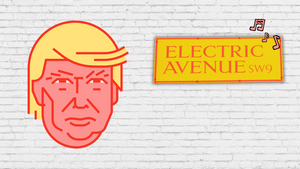Eddy Grant was forced to explain what his song 'Electric Avenue' is all about during a deposition with Donald Trump's lawyers in May, court documents made public last week have revealed. He was keen that the attorneys know that "songwriters don't, as a rule, sit there and explain ‘what did this thing mean?’".
A transcript of the deposition was made public last week as a US court gave more consideration to Grant's copyright lawsuit against Trump. He accuses the former President of copyright infringement over the use of 'Electric Avenue' in a social media video posted during the 2020 Presidential election campaign.
While politicians can often make use of music at events relying on licences from collecting societies like BMI and ASCAP, if they use a track in a video they would usually require a bespoke licence from whoever controls the recording rights and the song rights. No such licences were secured by the Trump campaign for their use of Grant's 1983 hit, hence the lawsuit.
Grant was inspired to write 'Electric Avenue' following the 1981 Brixton riots, the track taking its title from the Brixton street of that name. However, he told Trump’s lawyers, the lyrics can be interpreted more generally because, after all, "everyone interprets a song in their own way".
According to Business Insider, the deposition transcript shows that Grant was clearly and understandably frustrated to be asked to explain the meaning of ‘Electric Avenue’, given the song's themes aren't really relevant to his claim of copyright infringement.
Although, the Trump campaign has been trying to defeat the lawsuit by using the pesky fair use defence under US copyright law, which involves claiming that the ex-President's use of the track was "transformative". So maybe, for his lawyers, the original themes of the song are relevant.
"The bottom line of the song is that it is a protest against social conditions", Grant said. He then started referencing specific lyrics, before pausing to observe that Trump's lawyers can read the lyrics for themselves.
Is the song specifically about Brixton's Electric Avenue, a Trump attorney asked. Grant: "It's not specific inasmuch as that there are many Electric Avenues in the world. You know, it stands for something, and I've created something that stands for something else”.
“So you have a street or many streets, and it's become like ... meeting in Heaven or meeting in Hell. You've never been to Heaven and you've never been to Hell, but it connotes something in your memory or in the collective memory of human beings to say, 'You're going to Hell'".
So there you go. Does that help clarify Trump's liabilities for copyright infringement? Almost certainly not.
The judge overseeing this case previously declined to dismiss Grant's lawsuit based on the Trump side's fair use arguments. According to Reuters, last week Grant's lawyers urged the judge to go further and to completely reject the fair use claim and rule that Team Trump did indeed infringe the 'Electric Avenue' copyright. Which would mean that - if the case then proceeds to trial - a jury would only need to consider damages.
Meanwhile, the Trump side asked the judge to cut back Grant's lawsuit, which currently accuses the President and his campaign of infringing both the recording and song rights in 'Electric Avenue'. Trump's lawyers argue that, while Grant has control over a greatest hits album that includes the track, he does not actually own the copyright in the original recording.
/cloudfront-us-east-2.images.arcpublishing.com/reuters/UJVEMCJAQJIJ3NX3S3CILRSNVM.jpg)



